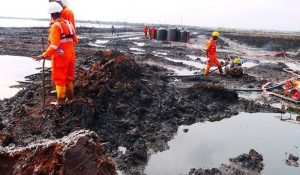
Joan Faluyi, passionate about sustainable energy, women empowerment, other poverty eradication gigs
Joan Faluyi is a highly accomplished executive with a proven track record of success in the energy, oil, and gas industry, and a committed social entrepreneur dedicated to making a significant impact in the community. With over 27 years of exceptional experience across various sectors, she is a dynamic and visionary leader known for innovating and introducing new businesses and processes in EPC servicing the energy, oil and gas, downstream, and mining extractives industries.
Currently serving as the Managing Director at Offshore Dimensions Limited, an engineering procurement and construction management company, servicing the energy, oil and gas sector in Nigeria, as well as a non-executive director at Petrolog Group, Joan’s strategic insights and innovative approaches have consistently propelled organisations towards growth and profitability. Her ability to manage finances, lead complex commercial negotiations, and foster multicultural work environments has solidified her reputation as a seasoned professional in her field.
Joan holds a B.Sc. degree in Economics and Management from Edo State University in Ekpoma, and an MBA from Enugu State University of Technology. Her commitment to continuous learning is further demonstrated by a diploma from the prestigious Oxford Princeton Program, where she focused on international LPG trading and pricing, supply, shipping contracts, and risk management. She is also a distinguished Fellow of strategic management, which underscores her expertise in strategic planning and business analysis.
What are some of the key challenges and opportunities you’ve seen in the energy, oil and gas industry over the course of your career? How has the industry evolved during your time?
In my experience within the energy, oil, and gas industry in Nigeria, I’ve witnessed both challenges and opportunities, particularly regarding funding for projects and women’s inclusion. Additionally, the evolving role of the Nigerian Content Development and Monitoring Board (NCDMB) in promoting indigenous businesses has significantly impacted the industry landscape.
Challenges:
1. Access to Funding: Securing adequate funding for projects remains a significant challenge in the Nigerian oil and gas sector. Limited access to capital, bureaucratic hurdles, and fluctuating oil prices can hinder the implementation of critical projects, including those aimed at promoting women’s inclusion and empowerment.
2. Gender Disparities: While there has been a noticeable increase in the number of women entering the oil and gas space in Nigeria, gender disparities persist, particularly in leadership roles and technical positions. Cultural barriers, unequal opportunities for skill development, and workplace biases continue to impede women’s advancement in the industry.
Opportunities:
1. Growing Women’s Participation: The increasing presence of women in the Nigerian oil and gas sector presents a significant opportunity for diversity and inclusion. Companies and government agencies can capitalize on this trend by implementing targeted initiatives to recruit, retain, and empower women, thereby unlocking their full potential and driving industry growth.
2. NCDMB’s Promotional Efforts: The evolving role of the Nigerian Content Development and Monitoring Board (NCDMB) in promoting Nigerian-owned businesses and local content development has created opportunities for indigenous companies to thrive in the Nigerian soil. By prioritising local content requirements and incentivising local participation, the NCDMB is fostering economic development, job creation, and technology transfer within the industry.
Evolution of the Industry:
Over the course of my career, I’ve observed significant evolution within the Nigerian energy, oil, and gas industry. The emergence of local content policies, spearheaded by agencies like the NCDMB, has reshaped the industry landscape by prioritising indigenous participation and capacity building.
Furthermore, there has been a growing emphasis on sustainability, environmental stewardship, and community engagement. Companies are increasingly adopting best practices in corporate social responsibility, community development, and environmental management to ensure responsible operations and long-term sustainability.
Despite these advancements, the industry still faces challenges such as infrastructure deficits, security concerns, and regulatory uncertainties. However, with a concerted effort from stakeholders across the public and private sectors, the Nigerian oil and gas industry can continue to evolve and thrive, driving economic growth, empowering local communities, and promoting inclusive development.
As the managing director of Offshore Dimensions Limited, what are some of the unique aspects of your role and responsibilities? How does your company differentiate itself in the market?
As the Managing Director of Offshore Dimensions Limited, my role encompasses a range of unique responsibilities that set our company apart in the competitive oil and gas market.
1. Strategic Leadership: One of my primary responsibilities is to provide strategic direction and leadership to ensure the continued growth and success of Offshore Dimensions Limited. This involves setting clear goals, defining business objectives, and aligning our operations with industry trends and market demands.
2. Partnership Management: Cultivating and nurturing strategic partnerships with industry-leading companies like Parker Hannifin is crucial to our success. As the leading expert in motion and control technology, Parker Hannifin enhances our technical capabilities and enables us to deliver best-in-class solutions to our clients.
3. Technical Excellence: Offshore Dimensions Limited prides itself on its technical expertise and proficiency in providing top-notch services to clients in the oil and gas sector. We invest in ongoing training and development for our team to ensure that we remain at the forefront of industry advancements and innovations.
4. International Recognition: Our commitment to excellence and customer satisfaction has earned us international recognition and accolades, including awards from esteemed partners like Parker Hannifin. These accolades serve as a testament to our dedication to quality, reliability, and performance.
5. Market Differentiation: Offshore Dimensions Limited distinguishes itself in the market by offering unparalleled service quality, technical expertise, and customer satisfaction. Our ability to deliver tailor-made solutions that meet the unique needs and challenges of our clients sets us apart from competitors.
In summary, my role as the Managing Director of Offshore Dimensions Limited involves strategic leadership, partnership management, fostering technical excellence, and ensuring customer satisfaction. Through these efforts, we differentiate ourselves in the market and maintain our position as a trusted leader in the oil and gas industry.
Can you share some insights into the engineering, procurement and construction management process for major energy projects? What are some best practices your company has developed?
At Offshore Dimensions Limited, we take pride in our track record of successfully handling engineering projects, procurement, and construction management for International Oil Companies (IOCs), National Oil Companies (NOCs), and other stakeholders. Our commitment to zero downtime, reliability, and dependability sets us apart in the industry.
Insights into Engineering, Procurement, and Construction (EPC) Management Process:
1. Comprehensive Planning: The EPC process begins with comprehensive planning, where we meticulously define project objectives, scope, timelines, and budgetary constraints. Clear communication and alignment with stakeholders are crucial at this stage to ensure project success.
2. Efficient Procurement: Efficient procurement practices are essential for timely project delivery and cost optimisation. We leverage our extensive network of suppliers and vendors to source quality materials and equipment at competitive prices, while also adhering to project specifications and regulatory requirements.
3. Streamlined Execution: Streamlined execution is key to managing complex energy projects effectively. Our team of experienced engineers, project managers, and construction professionals work collaboratively to ensure seamless coordination, timely resource allocation, and adherence to safety standards throughout the project lifecycle.
4. Robust Quality Assurance: Quality assurance is integral to our EPC management process. We implement robust quality control measures at every stage of the project, from design and engineering to procurement and construction, to ensure that deliverables meet or exceed client expectations and industry standards.
5. Continuous Monitoring and Improvement: Continuous monitoring and improvement are essential for optimising project performance and mitigating risks. We employ advanced project management tools and techniques to monitor progress, identify potential bottlenecks, and implement corrective actions proactively.
Best Practices Developed by Offshore Dimensions Limited:
1. Client-Centric Approach: We prioritise client satisfaction and strive to exceed expectations by delivering tailored solutions that address their specific needs and challenges.
2. Agile Project Management: We adopt an agile project management approach to adapt to evolving project requirements and market dynamics, ensuring flexibility and responsiveness throughout the project lifecycle.
3. Collaboration and Communication: We foster a culture of collaboration and open communication, both internally within our team and externally with clients and stakeholders, to ensure transparency, accountability, and alignment of objectives.
4. Emphasis on Safety: Safety is our top priority. We implement stringent safety protocols and promote a safety-first culture to protect our employees, contractors, and the environment.
5. Commitment to Sustainability: We are committed to sustainability and environmental stewardship, integrating eco-friendly practices and technologies into our projects to minimise environmental impact and promote long-term sustainability.
Overall, our focus on meticulous planning, efficient procurement, streamlined execution, robust quality assurance, and continuous improvement has enabled us to deliver successful EPC projects for major energy stakeholders while maintaining our reputation for reliability and dependability.
How has technology and innovation impacted your side of the energy industry? What emerging technologies or approaches are you most excited about?
Technology and innovation have had a profound impact on our side of the energy industry, particularly in engineering, procurement, and construction (EPC) management for offshore projects:
1. Advanced Engineering Tools: The adoption of advanced engineering software and tools has revolutionised the design and analysis process for offshore structures and equipment. Computer-aided design (CAD), computational fluid dynamics (CFD), and finite element analysis (FEA) enable us to optimize designs, improve performance, and minimize risks.
2. Digitalisation and Automation: Digitalisation and automation technologies have streamlined project management, procurement, and construction processes. Integrated project management systems, automated procurement platforms, and remote monitoring tools enhance efficiency, reduce errors, and accelerate project timelines.
3. Robotics and Drones: Robotics and drones are increasingly being used for inspection, maintenance, and construction activities in offshore environments. Unmanned aerial vehicles (UAVs) equipped with cameras and sensors can conduct aerial surveys, monitor assets, and perform visual inspections, improving safety and reducing downtime.
4. Advanced Materials and Manufacturing: The development of advanced materials and manufacturing techniques has enhanced the durability, performance, and cost-effectiveness of offshore equipment and structures. Composite materials, additive manufacturing (3D printing), and modular construction methods offer lightweight, corrosion-resistant solutions for offshore applications.
5. Renewable Energy Technologies: The transition towards renewable energy sources, such as offshore wind and solar power, presents new opportunities and challenges for the energy industry. Innovative technologies for offshore wind turbines, floating solar arrays, and tidal energy systems are reshaping the offshore energy landscape and driving sustainable development.
Emerging Technologies and Approaches:
1. Artificial Intelligence (AI) and Machine Learning: AI and machine learning algorithms are increasingly being applied to optimise asset performance, predict maintenance needs, and improve decision-making processes in the energy sector.
2. Energy Storage Solutions: Energy storage technologies, such as battery storage and hydrogen fuel cells, play a crucial role in integrating renewable energy sources into the grid and ensuring reliable power supply in offshore environments.
3. Digital Twins: Digital twin technology creates virtual replicas of physical assets, allowing for real-time monitoring, simulation, and predictive maintenance. Digital twins enable better asset management, performance optimisation, and risk mitigation for offshore projects.
4. Smart Sensors and IoT: Smart sensors and Internet of Things (IoT) devices enable remote monitoring, data collection, and condition-based maintenance for offshore equipment and infrastructure. IoT-enabled systems improve operational efficiency, reduce downtime, and enhance safety in offshore environments.
5. Carbon Capture and Storage (CCS): CCS technologies capture and sequester carbon dioxide emissions from industrial processes, mitigating greenhouse gas emissions and supporting climate change mitigation efforts. Offshore CCS projects have the potential to significantly reduce carbon emissions from energy production and industrial activities.
As a company at the forefront of offshore engineering and construction, we are excited about the opportunities that emerging technologies present for improving efficiency, sustainability, and safety in the energy industry. By embracing innovation and adopting new approaches, we aim to continue delivering cutting-edge solutions for our clients while contributing to a more sustainable energy future.
What strategies do you employ to ensure successful project delivery and client satisfaction? How do you manage complex stakeholder dynamics on large-scale energy projects?
At Offshore Dimensions Limited, we employ a range of strategies to ensure successful project delivery and client satisfaction. Our approach is centered around effective communication, meticulous planning, and proactive stakeholder management.
1. Clear Communication: We prioritise clear and transparent communication with our clients throughout the project lifecycle. Regular updates, progress reports, and milestone reviews ensure alignment of expectations and timely resolution of issues.
2. Meticulous Planning: Comprehensive planning is key to successful project delivery. We invest time and resources in detailed project planning, risk assessment, and contingency planning to anticipate challenges and mitigate potential risks.
3. Proactive Problem-solving: We adopt a proactive approach to problem-solving, addressing issues as they arise and implementing timely corrective actions. Our team is empowered to make decisions and take initiative to ensure project continuity and client satisfaction.
4. Stakeholder Engagement: Managing complex stakeholder dynamics is essential on large-scale energy projects. We engage with stakeholders at all levels, including clients, contractors, regulatory authorities, and local communities, to build trust, foster collaboration, and address concerns.
5. Continuous Improvement: We believe in continuous improvement and learning from past experiences. Post-project reviews, lessons learned sessions, and feedback mechanisms enable us to identify areas for improvement and implement best practices for future projects.
By implementing these strategies, we ensure successful project delivery, meet client expectations, and navigate complex stakeholder dynamics effectively in the dynamic energy industry.”
From your experience, what are the critical success factors for companies looking to thrive? What advice would you give to aspiring industry leaders?
From my experience, 28 years in the oil and gas industry, I’ve learnt that the critical success factors for companies aiming to thrive go beyond just technical prowess. While expertise and innovation are undoubtedly important, it’s the human element that truly sets successful companies apart.
First and foremost, fostering a culture of collaboration, respect, and empathy within the organisation is key. Building strong relationships with colleagues, partners, and stakeholders creates a supportive environment where everyone feels valued and motivated to contribute their best.
Secondly, adaptability and resilience are essential qualities, especially in an industry as dynamic and unpredictable as oil and gas. Embracing change, learning from failures, and remaining agile in the face of challenges are vital for long-term success.
Furthermore, a relentless commitment to safety, environmental stewardship, and ethical business practices is non-negotiable. Putting the well-being of employees, communities, and the environment at the forefront of decision-making builds trust and credibility, which are invaluable assets in the industry.
For aspiring industry leaders, my advice is simple yet profound: Never stop learning, never stop growing, and never lose sight of your values. Seek out mentors, embrace opportunities for personal and professional development, and always lead with integrity and humility.
Above all, remember that success is not measured solely by profits or market share, but by the positive impact we make on people’s lives and the world around us. By staying true to our purpose, prioritising people over profits, and embracing the power of human connection, we can truly thrive in the oil and gas industry and beyond.
How does your company approach sustainability and environmental responsibility in its work? What role do you see the industry playing in the energy transition?
At Offshore Dimensions Limited, we recognise the critical importance of sustainability and environmental responsibility in our work, particularly in a country like Nigeria where crude oil plays a significant role in the economy. Our approach to sustainability is twofold: proactive environmental stewardship and strategic investment in renewable energy initiatives.
Credit: Businessday









